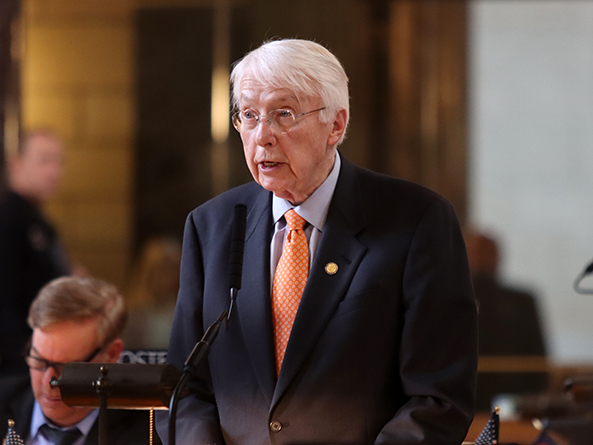Session Review: Business and Labor
Lawmakers considered several measures this session related to unemployment taxes and benefits as well as employee training programs.
Wages and benefits
Senators approved a bill that changes state law regarding name, image and likeness income opportunities for student athletes and authorizes a temporary reduction in the state’s unemployment tax rate.
LB1393, introduced by Blair Sen. Ben Hansen on behalf of Gov. Jim Pillen, updates provisions of state law governing NIL activity for student athletes, which involves the use of an individual’s name, image or likeness for commercial or promotional purposes.
Under the bill, Nebraska universities may assist student athletes with creating, identifying, facilitating or supporting NIL activities. A university may compensate a student athlete for the use of their name, image or likeness only if allowed by a college athletic association policy, court order or settlement agreement. The measure clarifies that NIL compensation of a student athlete does not inherently make the athlete an employee of the institution.
In addition, LB1393 changes the allowable yield factor when determining the combined tax rate under the state’s Employment Security Law and lowers the rate by 5% from Jan. 1, 2025, through Dec. 31, 2029.
The bill passed on a 42-0 vote and took effect immediately.
Senators debated a proposal that would have reduced the maximum eligibility for unemployment benefits in Nebraska under the Employment Security Law from 26 weeks to 16 weeks.
LB1170, introduced by Ralston Sen. Merv Riepe, also would have proportionally reduced the maximum benefit payable when a disqualification — such as voluntarily leaving work, misconduct or rejecting suitable employment — was assessed.
After approximately four hours of debate on general file, the Legislature adjourned for the day before voting on LB1170’s advancement. The measure was not scheduled for further debate.
LB1213, introduced by Fremont Sen. Lynne Walz, would have required businesses, state agencies and political subdivisions with at least 15 employees to provide a minimum of 20 hours of paid annual leave for employees to participate in a family member’s school related activities.
The bill did not advance from committee.
Training programs
Two employment training measures were advanced to general file by the Business and Labor Committee but were not scheduled for debate this session.
LB993, introduced by Sumner Sen. Teresa Ibach, would have created the Apprenticeship Grant Program to be administered by the state Department of Economic Development.
Under the bill, DED could have provided grants to qualified Nebraska businesses to reimburse the cost of on-the-job training and classroom instruction for underemployed individuals who also are receiving state-funded economic assistance.
Qualifying businesses would have been partnered with a registered apprenticeship program and required to offer full-time employment upon the successful completion of the apprenticeship with a wage sufficient to reduce the individual’s participation in economic assistance programs.
LB1408, introduced by Bellevue Sen. Rita Sanders, would have established mandatory training on human trafficking issues for hotel employees in Nebraska. The bill would have required the state’s existing human trafficking task force to work with the state Department of Labor to develop a curriculum for the training and determine how it would be provided.
LB1408 also would have required hotels to implement procedures for reporting suspected human trafficking and a prevention policy for all employees. A hotel out of compliance with the bill’s provisions would have had 90 days to remedy the violation before being placed on a list of noncompliant entities.


